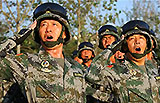Iran, Syria to highlight Putin's Israel visit
(Xinhua) Updated: 2012-06-24 22:01JERUSALEM - Iran's controversial nuclear program and the crisis in Syria are expected to be on top of the agenda of Russian President Vladimir Putin's visit to Israel, which will start on Monday, officials said in Jerusalem.
Russia, a member of the United Nations Security Council and Iran's main trade partner, has been at odds with the United States and some other Western nations on whether to impose stiffer sanctions on Tehran.
The United States, along with Israel, has long accused Iran of secretly developing nuclear weapons. Vehemently denying the accusation, Iran insists its disputed nuclear program is only for peaceful purposes. A number of fresh rounds of talks have been held between Iran and the five permanent UN Security Council members plus Germany (P5+1).
Israeli Prime Minister Benjamin Netanyahu and his senior ministers have refrained from publicly calling on Moscow to join the West in adopting a tougher stance toward Iran, fearing an angry response from Putin, according to Israeli media.
But both the prime minister's office and the foreign ministry are reportedly highly critical of Russia's stance on Tehran's nuclear ambitions and the ongoing conflict in Syria.
"The road to stopping Iran goes through Putin. The Russians are a tiebreaker. At the moment, it doesn't seem that they have a reason to change their policy," the Israel Hayom daily quoted a senior official in Jerusalem as saying.
Despite the pessimistic assessment, Iran's suspected nuclear program will top the agenda of Putin's 24-hour visit in Jerusalem, with his hosts expected to press for a turnabout in Moscow's policy on Iran and arms sales to Syria, Israel's enemy to the north.
"The message (the Russians) will receive is that Israel can't tolerate a nuclear Iran," said Yaakov Livne, head of the Russia desk at the Israeli foreign ministry, according to Israel Hayom.
"Of course we prefer a diplomatic solution, but we will use any means to protect Israel's survival... We expect Russia, as a member of the Security Council, to demonstrate responsibility and help to prevent the Iranian nuclear race. I think that will be the most important issue (to be discussed during the visit)," he said, "I don't think Russia is interested in a nuclear Iran. I think Russia has an interest in a stable Middle East where radical Islam does not rule."
A local analyst speculated that Putin's visit was also designed to send a message to Tehran.
"One of the reasons Putin is coming to Israel is to put pressure on the Iranians, to say, 'If you don't compromise, I will align myself more with the country that you consider to be your enemy'," Israel Hayom quoted Iranian-born Meir Javedanfar as saying.
The visit, Putin's first to Israel, comes on the heels of the inconclusive end of the third round of talks between Iran and the world powers in Moscow last week, which yielded no breakthroughs in persuading Tehran to halt nuclear fuel enrichment, with another round of talks scheduled for July.
Israel, which views Iran's nuclear program as an existential threat, has more than hinted that it is preparing a military option to prevent the Islamic republic from acquiring a nuclear bomb.
Israeli Foreign Minister Avigdor Lieberman, a fluent Russian speaker, will greet Putin at Ben-Gurion International Airport, where the Russian leader is slated to arrive Monday with an entourage of 300 people, including high-ranking government officials, advisers and media.
Putin is scheduled to attend Monday the inauguration of a new monument commemorating Red Army soldiers who fought in World War II in the coastal city of Netanya.
Later in the day, Putin's Israeli counterpart, Shimon Peres, will host him for "an authentic Russian dinner," which will be attended by a group of Russian-speaking youth, according to local media reports. The two presidents will then hold a closed-door meeting to discuss several topics, including the strengthening of strategic ties, the stalled peace process and other regional issues.
Also on Monday, Putin and Netanyahu will hold a joint press conference.






